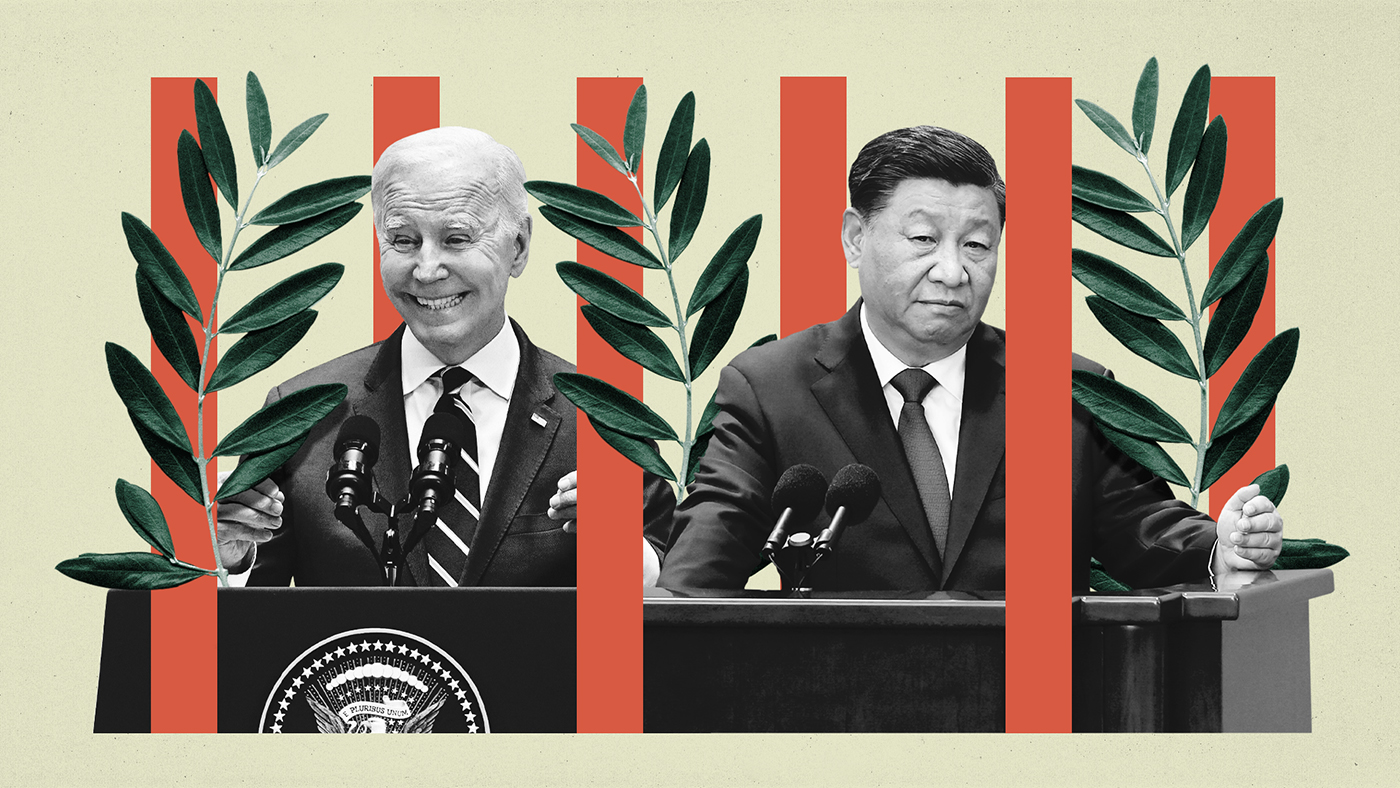US-China talks: can Biden mend ties with Beijing?
Treasury Secretary Janet Yellen to use visit to ‘re-establish contact’ between world’s two largest economies

A free daily email with the biggest news stories of the day – and the best features from TheWeek.com
You are now subscribed
Your newsletter sign-up was successful
The US treasury secretary heads to China this week hoping to lay the groundwork for improved communication and relations between the world’s two largest economies.
Janet Yellen will arrive in Beijing on Thursday and spend four days there meeting top Chinese officials and US business leaders. While she is not expected to meet China’s President Xi Jinping, her trip is still significant and comes just weeks after US Secretary of State Antony Blinken was in China trying to set a “floor” under the strained relationship.
Yellen “has long signaled the Biden administration’s desire to deepen communication and lower the temperature”, CNN reported. She has distanced herself from more hawkish voices calling for the US to “decouple” completely from China. Instead she has been stressing the importance of maintaining a healthy relationship and told a group of top American executives last month that it is critical for the US to work with China on specific and urgent global challenges.
The Week
Escape your echo chamber. Get the facts behind the news, plus analysis from multiple perspectives.

Sign up for The Week's Free Newsletters
From our morning news briefing to a weekly Good News Newsletter, get the best of The Week delivered directly to your inbox.
From our morning news briefing to a weekly Good News Newsletter, get the best of The Week delivered directly to your inbox.
What did the papers say?
Yellen’s trip will be a “test of the Biden administration’s ability to improve relations with China while pursuing an economic strategy aimed at reducing US companies’ reliance on Chinese factories”, said The Washington Post.
The scale of the challenge should not be underestimated, with bilateral relations “now widely seen to be at their lowest level” since the establishment of formal diplomatic ties in 1979, “and trapped in a downward spiral”, wrote Wei Wei for South China Morning Post.
They hit a new low earlier this year after a suspected Chinese spy balloon flew over the US, while recent efforts at reconciliation were damaged when President Biden called his Chinese counterpart a “dictator” and dismissed China as a country with “real economic difficulties”.
Meanwhile, “the consensus in Washington on a tough China policy continues to strengthen”, said Wei.
A free daily email with the biggest news stories of the day – and the best features from TheWeek.com
Recent diplomatic efforts have looked to change the mood music coming from the Biden administration, although the US and China “remain at odds over many issues”, said the Financial Times (FT). Washington is “concerned about China’s military activity around Taiwan and anti-espionage and counter-sanctions laws that complicate US business operations in China”, reported the paper. Beijing has accused the US of interfering in Taiwan and imposing sweeping export controls designed to “de-risk” the US commercial relationship with China and make it harder to secure advanced microchips.
Alongside security considerations are concerns about the impact of China’s stalling recovery from Covid. “Weakness is evident at home and abroad,” said The Washington Post, with Chinese consumer spending underperforming, export orders down sharply and the yuan approaching its lowest value against the dollar since the 2008 financial crisis. A saturated property market and ageing population have added to the perception that China’s economic miracle may have run its course and its economy is no longer resilient enough to prop up the rest of the world.
What next?
US officials have sought to downplay the chance of any “significant breakthroughs” coming out of this week’s trip, according to the FT. Yellen is expected to focus on issues such as the global economy, developing country debt relief and potential cooperation on climate change. The paper added that she will also not shy away from discussing “areas of concern”, like documented allegations of human rights abuses, ways to responsibly manage competition between the two powers and how to respond to what one US Treasury official described as China’s “unfair economic practices”.
There may be little expectation the trip will “resolve – or even address – all the thorny issues dividing the two countries”, said Axios. “But administration officials want to improve the lines of communication on economic issues.”
Yellen suggested as much in an interview with MSNBC last week, saying “my hope in travelling to China is to re-establish contact”. She then added – in reference to a new economic team recently installed in Beijing – that “there are a new group of leaders, we need to get to know one another”.
She may also use the trip to read between the lines, said Axios, having “used previous meetings with Chinese officials to get a real-time readout of China’s economy”.
The good news is that Washington and Beijing are at least talking again, said The Wall Street Journal. “The test now is whether they can settle into a new normal that avoids upending the global economy – or fall back into a cycle of acrimony and retaliation.”
-
 Switzerland could vote to cap its population
Switzerland could vote to cap its populationUnder the Radar Swiss People’s Party proposes referendum on radical anti-immigration measure to limit residents to 10 million
-
 Political cartoons for February 15
Political cartoons for February 15Cartoons Sunday's political cartoons include political ventriloquism, Europe in the middle, and more
-
 The broken water companies failing England and Wales
The broken water companies failing England and WalesExplainer With rising bills, deteriorating river health and a lack of investment, regulators face an uphill battle to stabilise the industry
-
 Taiwan eyes Iron Dome-like defence against China
Taiwan eyes Iron Dome-like defence against ChinaUnder the Radar President announces historic increase in defence spending as Chinese aggression towards autonomous island escalates
-
 Israel's wars: is an end in sight – or is this just the beginning?
Israel's wars: is an end in sight – or is this just the beginning?Today's Big Question Lack of wider strategic vision points to 'sustained low-intensity war' on multiple fronts
-
 Middle East crisis: is there really a diplomatic path forward?
Middle East crisis: is there really a diplomatic path forward?Today's Big Question Recent escalation between Israel and Hezbollah might have dented US influence in the conflict
-
 Missile escalation: will long-range rockets make a difference to Ukraine?
Missile escalation: will long-range rockets make a difference to Ukraine?Today's Big Question Kyiv is hoping for permission to use US missiles to strike deep into Russian territory
-
 Who would fight Europe's war against Russia?
Who would fight Europe's war against Russia?Today's Big Question Western armies are struggling to recruit and retain soldiers amid fears Moscow's war in Ukraine may spread across Europe
-
 Are Ukraine's F-16 fighter jets too little too late?
Are Ukraine's F-16 fighter jets too little too late?Today's Big Question US-made aircraft are 'significant improvement' on Soviet-era weaponry but long delay and lack of trained pilots could undo advantage against Russia
-
 Hamas and Hezbollah strikes: what does it mean for Israel?
Hamas and Hezbollah strikes: what does it mean for Israel?Today's Big Question Iran vows revenge for death of Hamas political leader in Tehran, hours after Israeli strike kills top Hezbollah member in Beirut
-
 What would war between Israel and Hezbollah look like?
What would war between Israel and Hezbollah look like?Today's Big Question A conflict that neither side wants could cause devastation and spark direct US-Iran confrontation